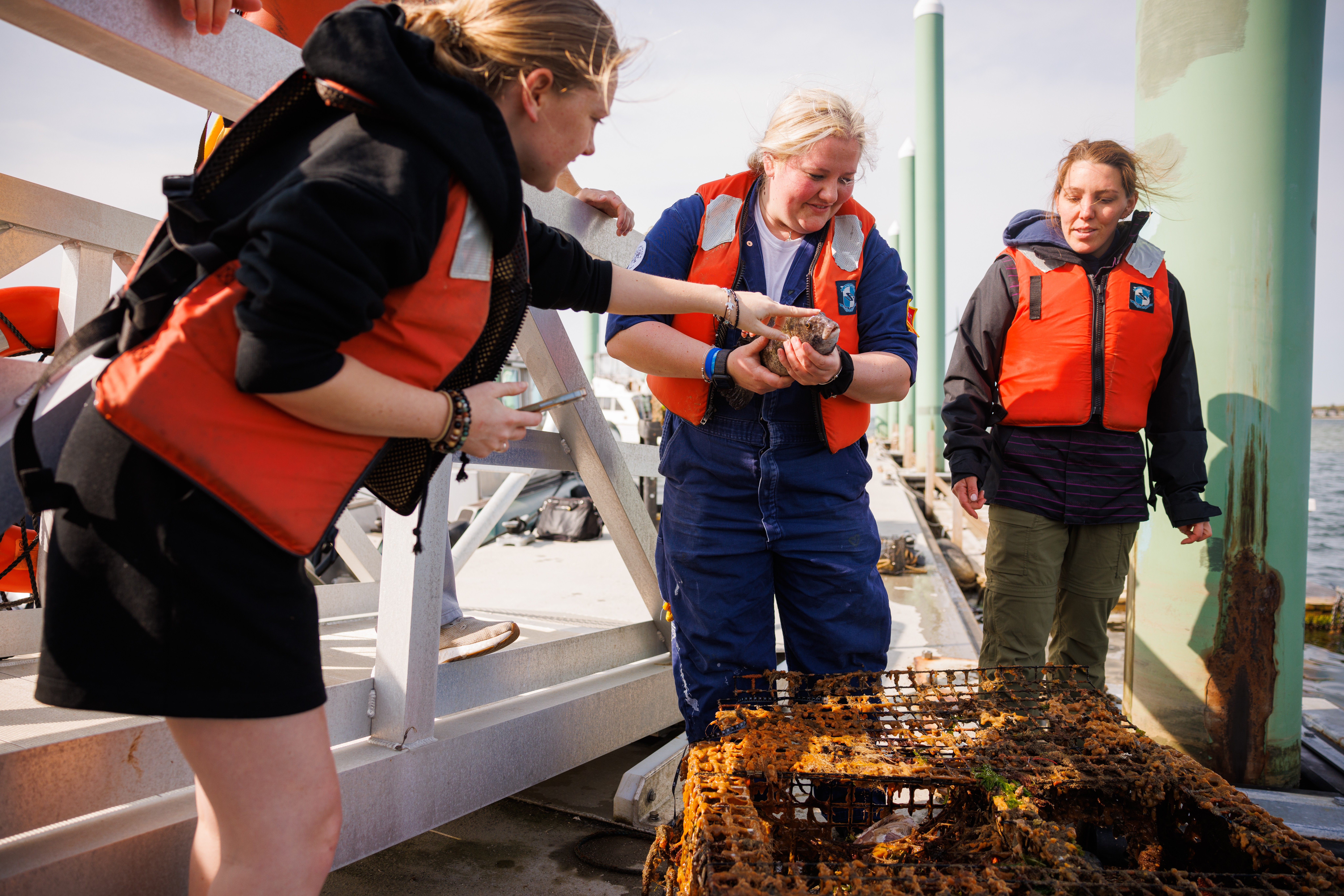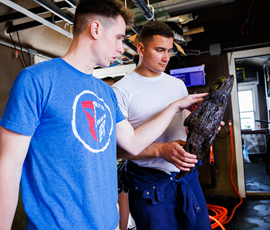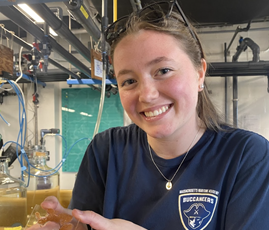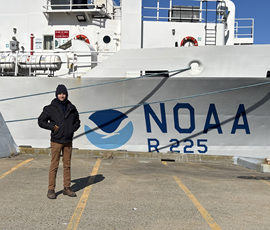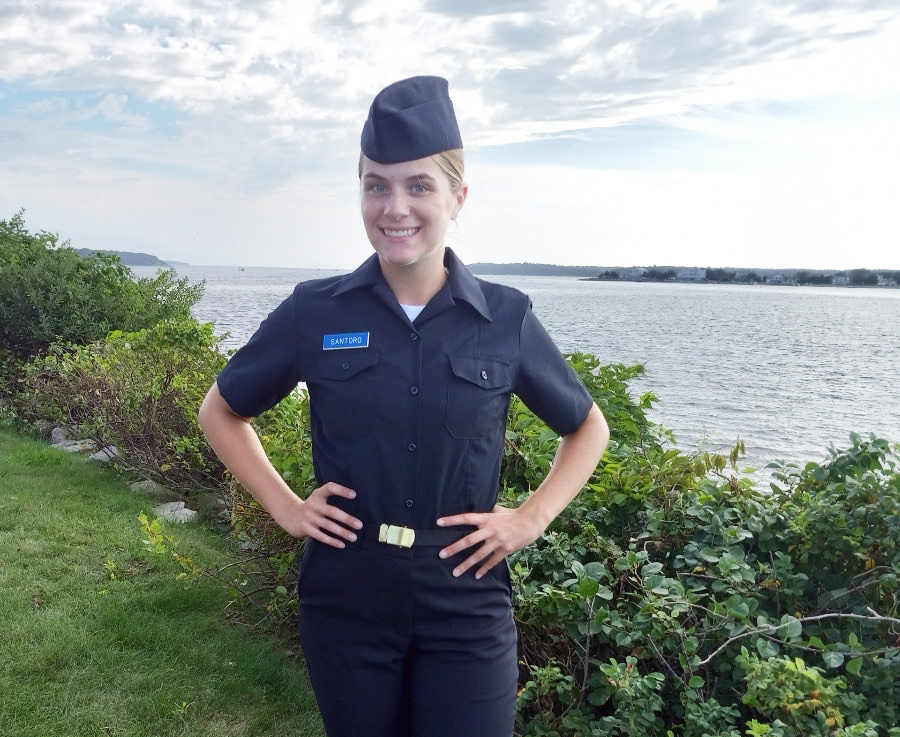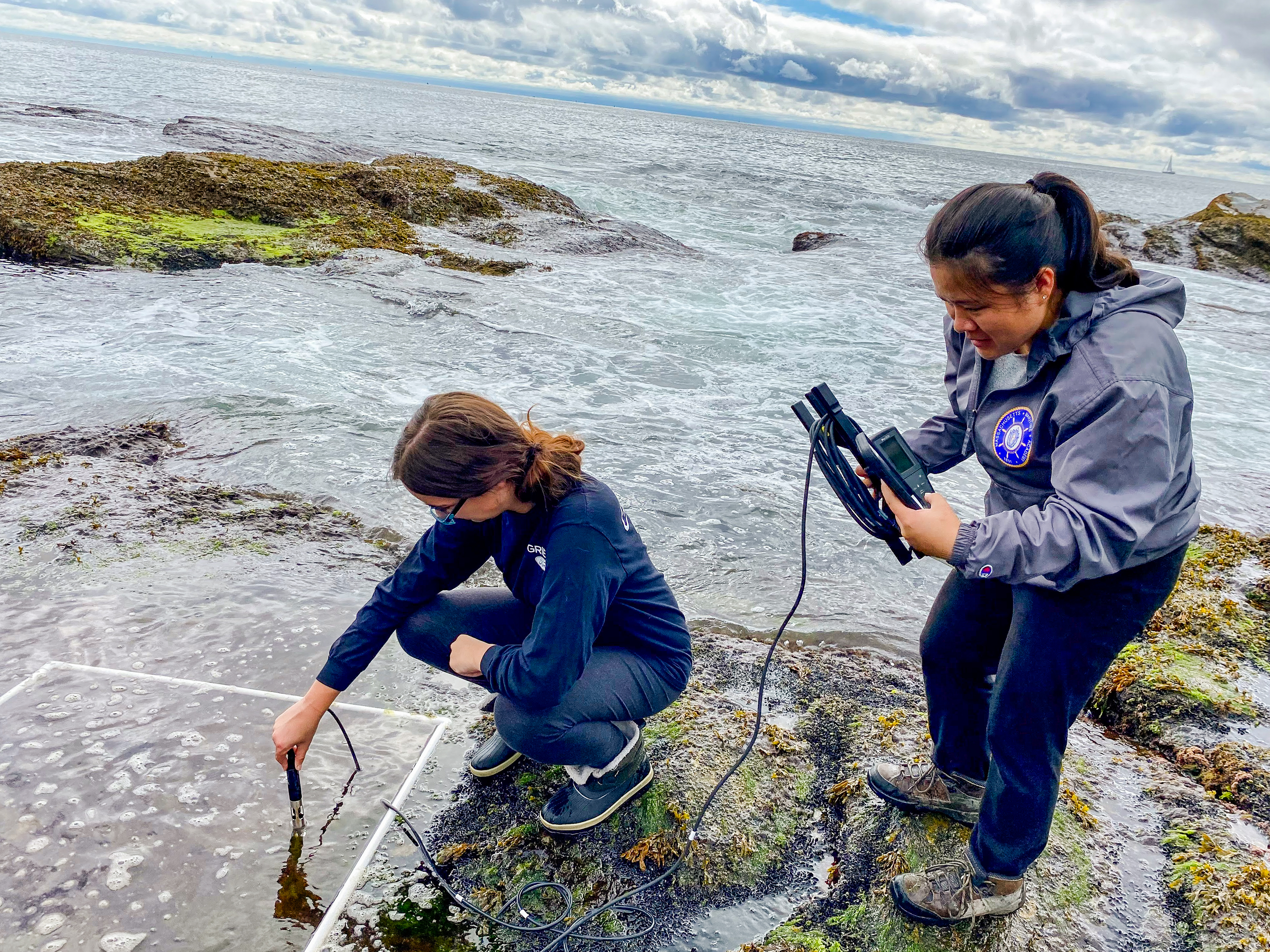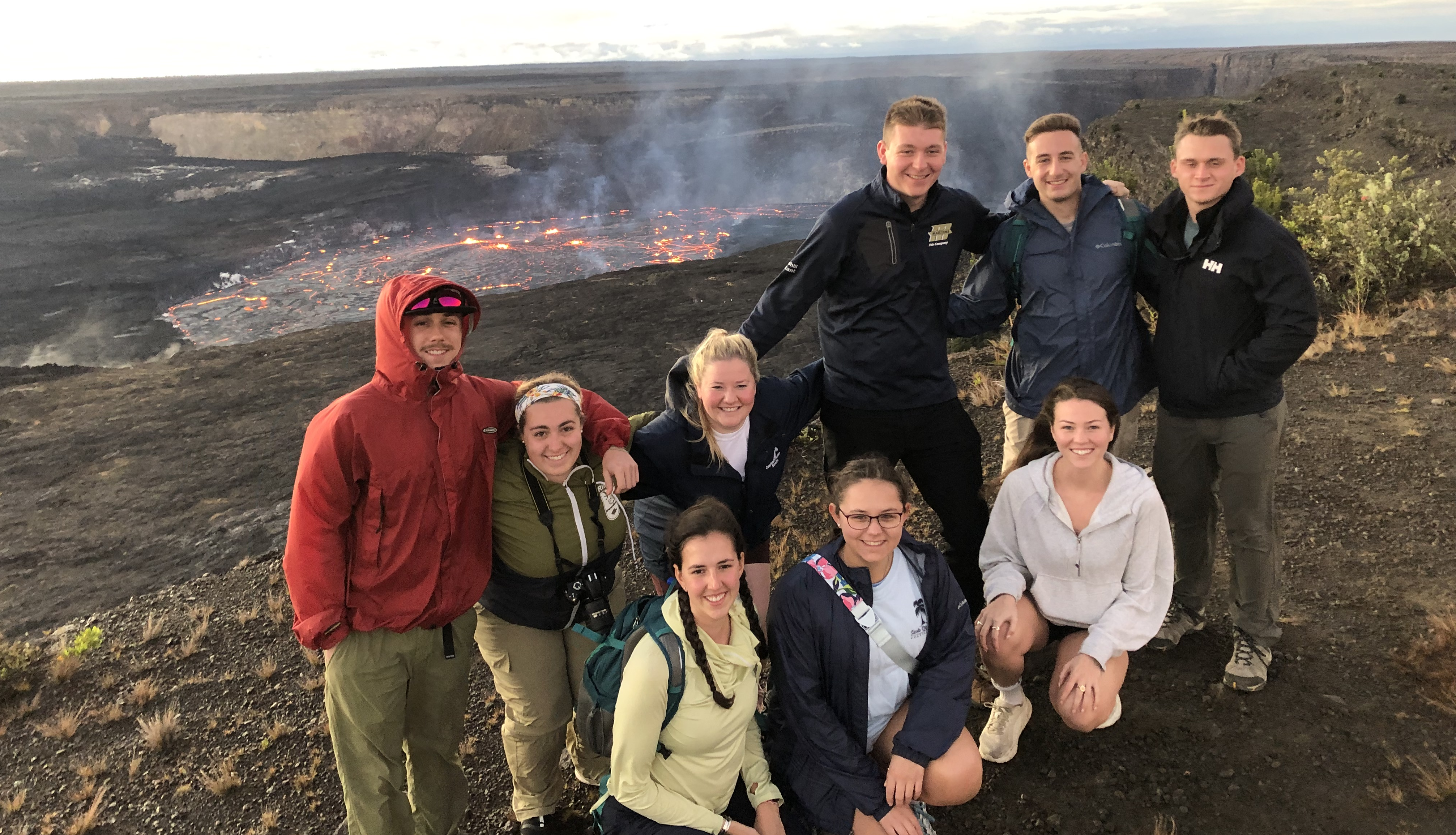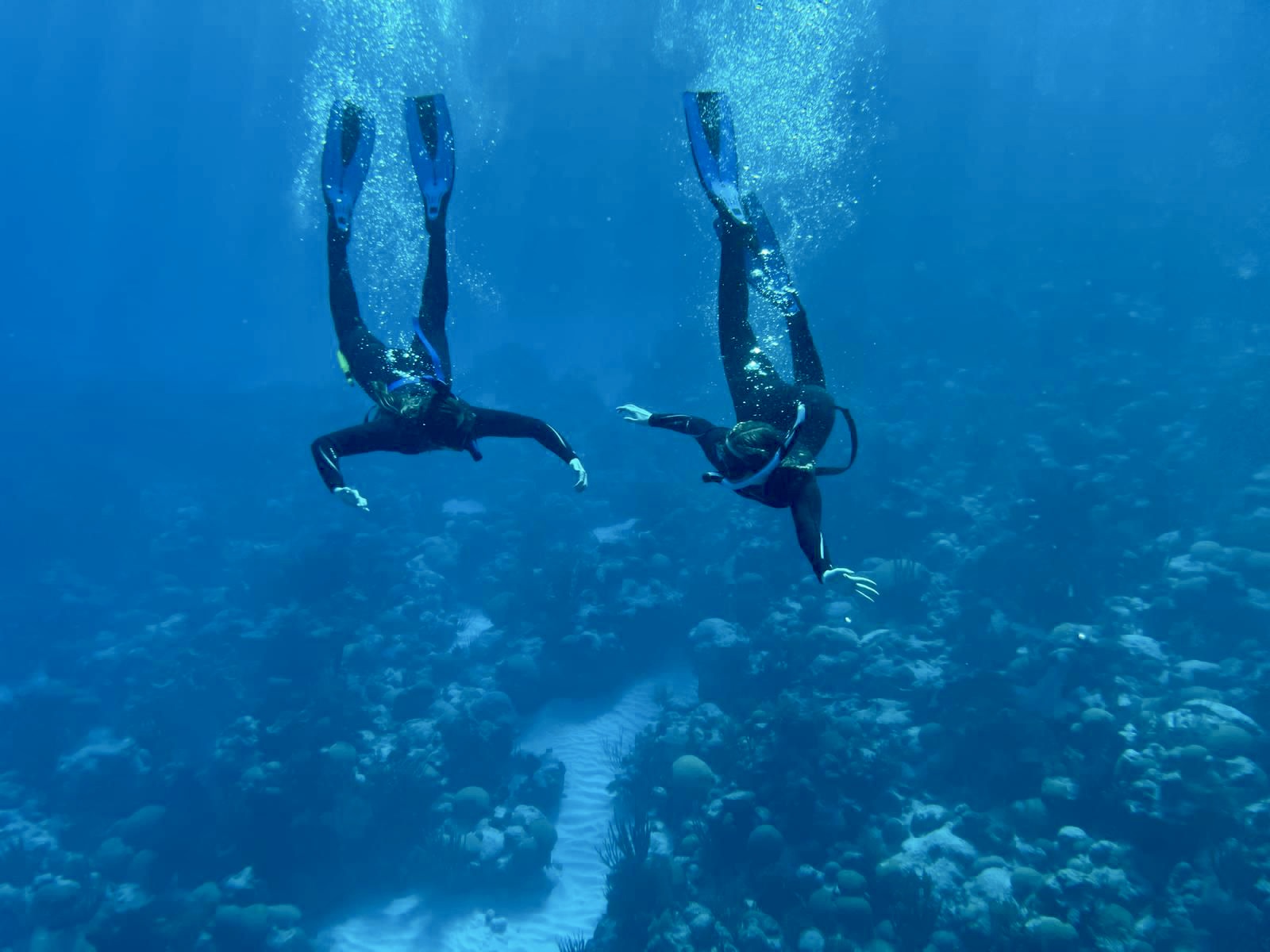Menu toggle
Degree Overview
The Marine Science, Safety, and Environmental Protection (MSSEP) program focuses on enhancing coastal and ocean environments and promoting health and safety in the workplace, our lives, and our environment. Graduates are prepared to boost the blue economy and be leaders in environmental stewardship.
All first-year cadets participate in a tropical ecology field course in Bermuda. Cadets snorkel at a variety of reefs to study how these incredible ecosystems function. The field course also includes hikes through forests, mangroves, and caves. Cadets learn about environmental impacts and solutions.
This program requires a six-week co-op and a three-credit co-op with opportunities in 1) environmental health and safety at top industries, hospitals, and research institutions; 2) marine science with scientific institutions such as the Woods Hole Oceanographic Institution and government agencies such as NOAA; and 3) environmental and wildlife protection with non-profits and government agencies such as the Department of Environmental Protection. An in-house stormwater monitoring co-op prepares students for careers in environmental protection.
As an MSSEP major, you will:
- Engage in coastal and offshore field work
- Explore scientific concepts using hands-on methods
- Utilize technology critical for environmental and marine science
- Apply practices in marine and industrial safety
- Assess environmental and human health risks
- Analyze coastal zones and associated management strategies
- Deliver presentations on complex topics within the marine science and the marine safety fields
- Develop skills in technical and scientific writing
Academic Requirements
To be considered for admission to Massachusetts Maritime Academy, candidates must be capable of college-level study and meet the minimum requirements below:
- 4 years of English
- 4 years of Mathematics (At least one course must be completed during senior year. *:
- Algebra I
- Geometry
- Algebra II
- Precalc/Trigonometry
- 3 years of Science: At least three of these courses must include labs. Technology/Engineering courses must be designated as science courses (taken for science credit) by the high school:
- Biology
- Chemistry
- Physics
- 2 years of Social Science: Including one course in United States History
- 2 years of Foreign Language: Two sequential, one-year courses in either a classical or modern language
- A foreign language waiver may be given to students attending a vocational technical high school or those who have received a waiver from their high school.
- 2 Elective Courses
Test Requirements
The submission of SAT or ACT scores is optional. For more information, please review our Test Optional Policy.
If you choose to submit your standardized test scores, you must submit official test scores from either The College Board (SAT) or The ACT (ACT). When taking the exam, have your scores sent directly to Massachusetts Maritime Academy. Please note, score requests can take between 2-4 weeks to be delivered and added to a student's application.
- Average SAT Score: 1050-1100* (SAT Code: 3515)
- Average ACT Score: 22-23 (ACT Code: 1856)
- *We will superscore your SAT scores.
How to prepare for this major:
- Four years of college prep math. Pre-calculus is strongly encouraged.
- 3-4 years of lab science, including Biology, Chemistry and Physics.
- An overall GPA of 3.0 or above.
- Final grade of B or better in all math, science, engineering related courses.
MSSEP graduates go on to a variety of careers in environmental health and safety, science, and environmental monitoring and protection. Some select a life at sea as environmental officers on cruise liners or research vessels. Others pursue careers on land with industries, non-profits, schools, or government agencies.
Some of the careers of our graduates include:
• Environmental Health & Safety Specialist
• Environmental Officer at Cruise Lines (including Celebrity, Norwegian, and Disney)
• NOAA Commissioned Officer Corps
• Aquaculture Specialists
• Environmental Scientist
• Research Associate with scientific institutions and various foundations, such as the Marine Biological Laboratory
- Students should monitor aquatic systems to produce and evaluate data regarding chemical, biological, physical and/or geologic properties of such systems.
- Students should apply practices in marine and industrial safety.
- Students should assess environmental and human health risks.
- Students should analyze coastal zones and associated management strategies.
- Students should develop and deliver purposeful presentations on complex topics within the marine science and the marine safety fields.
- Students should evaluate the primary scientific literature and apply their analysis by composing effective scientific research papers.
- Students should apply marine science, safety and/or environmental protection knowledge and skills to cooperative experiences.
The Marine Science and Aquaculture Laboratory along with several small MSSEP research vessels are incredible learning platforms for students to engage in hands-on science both onshore and offshore. The MSSEP Department supports student-focused research. Recent student projects include underwater video mapping of eelgrass and shell beds, monitoring dissolved oxygen and temperature to inform local fisheries, and tracking invasive marine species.
The MSSEP Department receives funding from multiple local municipalities to monitor stormwater. Since 2018, MSSEP students have helped to lead this environmental protection effort.
MSSEP students also travel the globe for experiential learning. In the freshmen year, MSSEP cadets complete a field course in Bermuda at the world-class Bermuda Institute of Ocean Sciences (BIOS). The course focuses on studying the biology of reef systems, mangroves, and forests at sites across the island. A second field course in Hawaii is a departmental elective. Cadets selecting to engage in this course will study the geology, ecology, and environmental issues as a junior or senior in Hawaii.
MSSEP faculty aim to see our students succeeding in the field. Faculty connect students to their wide network in research, industry, non-profit, and government agencies. This leads to meaningful co-ops, hands-on experiences, and learning opportunities in marine science, environmental health and safety, and environmental protection. This faculty-led networking has resulted in many unique student opportunities.
Recently, MSSEP students have participated in the following:
- Participation in NOAA’s Ecosystem Monitoring research cruises
- Research on ocean temperatures and oxygen levels with NOAA’s Environmental Monitors on Lobster Traps and Large Trawlers (eMOLT) program
- American Society of Safety Professionals Student Chapter networking events and engagement in the MMA Safety Night Speaker Series
- Tours of construction companies, boat yards, and cruise ships to evaluate safety procedures
- Behind the scenes tours of the Marine Biological Laboratory and Harvard Museum of Natural History
- Professional conferences focused on marine science and GIS
- Citizen science and research projects at local beaches
- Oil spill cleanup exercises
- Offshore eelgrass monitoring research
- MA Coastal Zone Management rapid assessment survey for marine invasive species
At Massachusetts Maritime Academy, Marine Science, Safety, and Environmental Protection - known as MSSEP - prepares students to tackle some of today’s most pressing environmental challenges. From safeguarding our oceans to managing marine resources and ensuring safety in the maritime industry, this program blends science, sustainability, and hands-on experience.
Watch the video to see how MSSEP combines rigorous academics with real-world training to develop environmental leaders. Students study marine ecosystems, hazardous materials handling, and environmental compliance, while gaining field experience through labs, internships, and partnerships with organizations like Woods Hole Oceanographic Institution. Graduates are ready for impactful careers in environmental protection, maritime safety, and beyond.
Marine Science, Safety & Environmental Protection Partnerships
Program Highlights & Partnerships
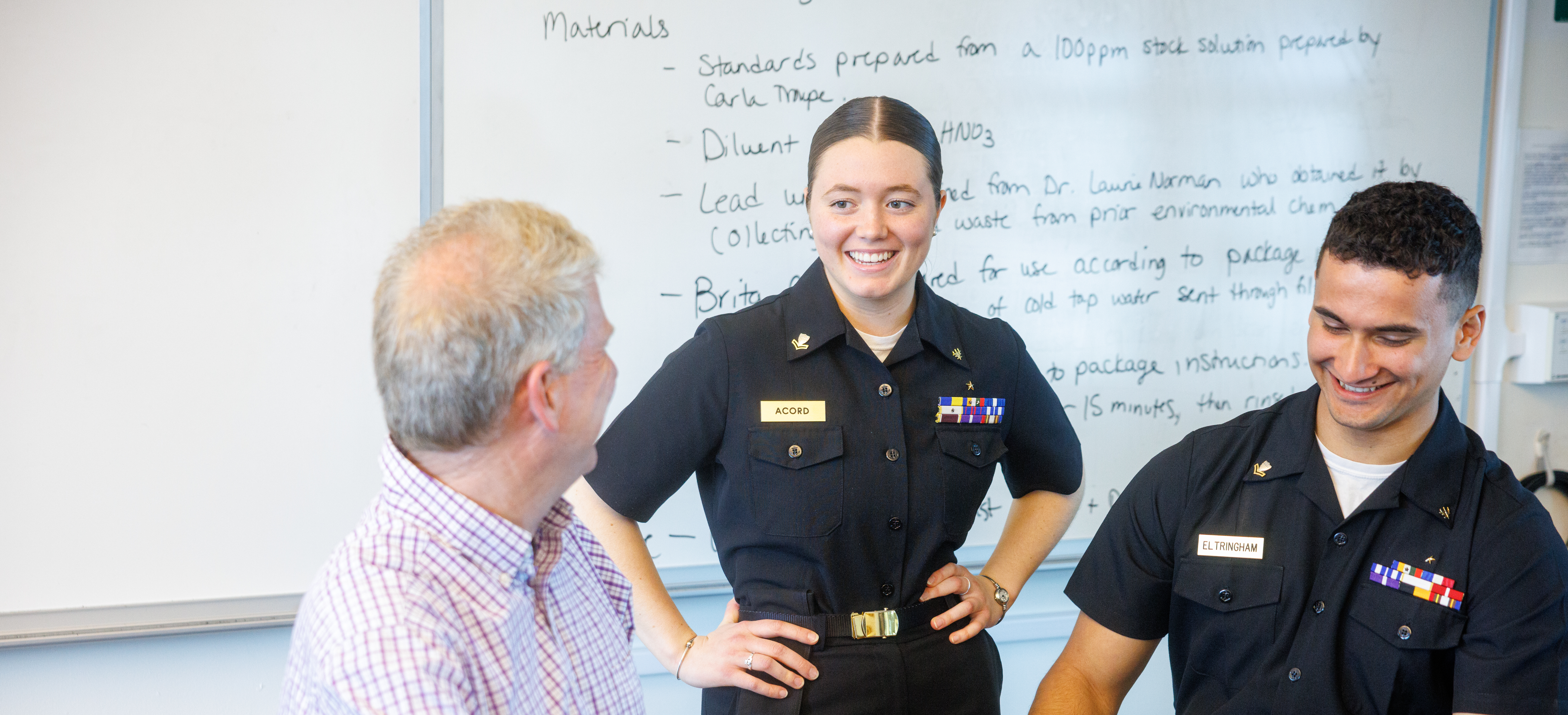
Since 2024, several MSSEP students have volunteered as scientists aboard NOAA's Ecosystem Monitoring (EcoMon) cruises on the Henry B. Bigelow. EcoMon surveys are carried out at 120 randomly chosen stations and 35 fixed stations throughout the continental shelf and slope of the northeastern United States. At each station, MSSEP students collected and preserved plankton, larval fish, and eggs captured by bongo nets. These samples were used to calculate estimates of overall fish biodiversity and spawning stock biomass. Students also measured and preserved chlorophyll and nutrients captured at different depths using a CTD Rosette. To hear more about exciting student-based research opportunities in MSSEP, please reach out to Department Chair Heather Burton (hburton@maritime.edu).
Learn More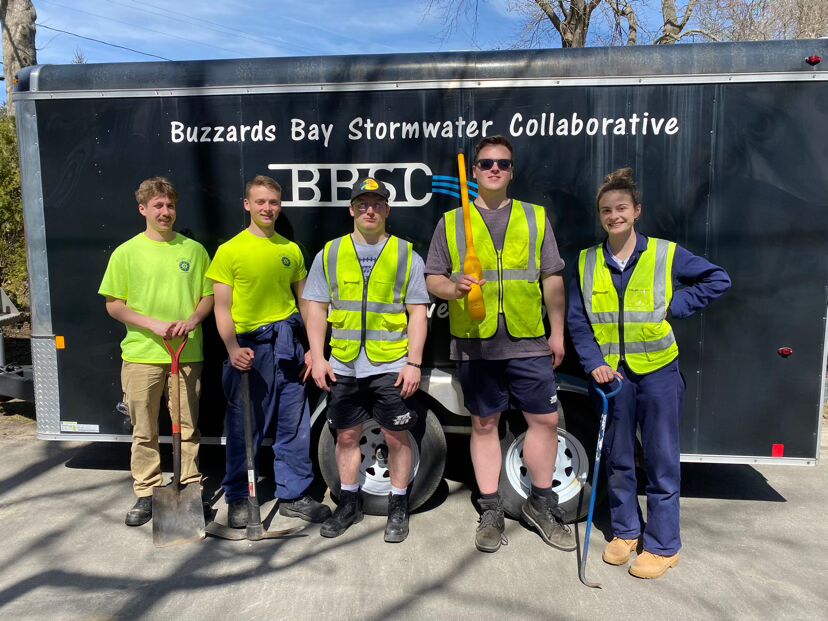
The Buzzards Bay Stormwater Collaborative is a partnership between the Buzzards Bay NEP, Massachusetts Maritime Academy, and eight Buzzards Bay towns (Bourne, Wareham, Marion, Mattapoisett, Acushnet, Fairhaven, Dartmouth, and Westport).
Learn MoreHear from our students
Additional Resources
Moran Environmental
Army Corps of Engineers
NOAA Corps
AECOM
Triumvirate
Woods Hole Oceanographic Institute
RIMKUS Construction Consulting
Health/Sanitary Inspectors for Municipalities
Eversource
Ultragenix
Thermofisher
Aquatech Environmental
Ørsted
Novartis
Massachusetts Port Authority
JLL
Fuss & O’Neill
Clean Harbors
Marine Biological Laboratory
Striped Bass Initiative
U.S. Fish and Wildlife
MA Department of Environmental Protection
Aquaculture Industries, such as Scallop Bay Shellfish Co. and Island Creek Oysters Royal Caribbean, Norwegian, Celebrity, and Disney Cruise Lines
American Society of Safety Professionals (ASSP)
Buzzards Bay Coalition Buzzards Bay Stormwater Collaborative
Massachusetts Office of Coastal Zone Management
Society for Women in Marine Science (SWMS)
OSHA 30
OSHA 40
NFPA Hot Work Safety Certification

Request Information
Gain the skills you need by joining the Massachusetts Maritime Academy, a fully accredited four-year co-educational state university offering Bachelor and Master of Science degrees. Massachusetts Maritime Academy is highly regarded in the worldwide maritime industry and beyond and is equipped with state-of-the-art technology to train the next generation of industry leaders.
Learn More
Connect
There are so many ways to explore life as a future Buccaneer! Visit campus for an in-person tour, attend a virtual event, or chat with a current cadet or your admissions counselor one-on-one. Get answers about the admissions process, learn more about our majors and discover opportunities that will shape your college experience. Check out the options below to make connections and get to know Massachusetts Maritime Academy.
Learn More
Visit Massachusetts Maritime Academy
There is no better way to learn about the Academy than by visiting our beautiful, waterfront campus! Currently, campus is open for in-person tours available on a first-come, first-served basis. To register for a campus tour you will need to create an account and search under Events. If you already have an application portal, please log in using your existing credentials.
Learn More